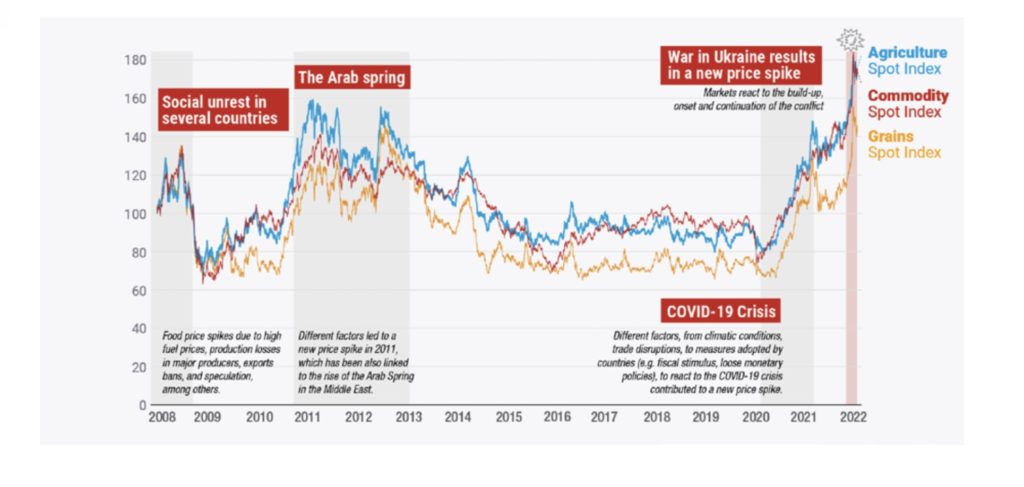New York, April 13 – The Russian war in Ukraine not only has caused “terrifying levels” of death, destruction and suffering in Ukraine, it has also triggered food, energy and finance crises that particularly are impacting on scores of poor countries with a total of 1.7 billion people, the United Nations said in a first report on the Global Impact of War in Ukraine on Food, Energy and Finance Systems.
The 22-page report said preliminary assessments showed that the 1.7 billion people exposed to the war’s repercussions live in 107 poor economies in Africa, Asia and the Pacific and in the Caribbean and Latin America regions.
“These are countries where people struggle to afford healthy diets, where imports are essential to satisfy the food and energy needs of their populations, where debt burdens and tightening resources limit government’s ability to cope with the vagaries of global financial conditions,” the report said. It said either of the Covid-19 pandemic, debt payments, climate change or food shortages and blackouts can collapse the economy. Of the 1.7 billion people, 553 million people are already poor and 215 million are already malnourished.
“Since the Russian Federation’s invasion of Ukraine, the world’s attention has been focused on the war’s terrifying levels of death, destruction and suffering” while less attention has been paid to impacts of poverty, hunger and social unrest, UN Secretary-General Antonio Guterres said in presenting the report.
Guterres said 36 countries, including some of the poorest countries, rely on Russia and Ukraine for more than half of their wheat imports and the war has made a bad situation worse. He said Russia is a top supplier of oil and gasoline but oil prices are up more than 60 per cent in the past year while gas prices have risen by 50 per cent while fertilizers have double in price.
“But now is also the time to turn this crisis into an opportunity,” Guterres said. “We must work towards progressively phasing-out coal and other fossil fuels, and accelerating the deployment of renewable energy and a just transition. “
“We need to pull developing countries back from the financial brink. The international financial system has deep pockets. I have been strongly advocating for its reform. But developing countries need help now, and the funds are there.”

Developing countries under the Sword of Damocles, the report said (excerpts):
Food
The report said the war has impacted on food production and caused rising food prices worldwide which will be felt through 2023. Russia and Ukraine are major wheat and maize producers as well as fertilizers.
“Food and energy import bills are already at record levels, and it seems inevitable that these will continue to rise. This will have widespread impacts that could be far-reaching, but the consequences for poorer and vulnerable people, will be particularly severe. Many food producers are not able to access the agricultural inputs they need.”
Energy
“Energy markets were already tight before the start of the crisis, following strong consumer demand and high GDP growth in 2021. Though crude oil and natural gas are still around 50 per cent above their level at the start of the year, they have witnessed volatile trading sessions following key announcements since the start of the war and, in particular, the commitment by the United States to release 180 million barrels of oil over the next six months.
“The significant increase in oil and gas prices may lead to counteracting effects in the longer term. On the one hand, it may shift investments back into extractive industries and fossil fuel-based energy generation, running the risk of reversing the trend towards decarbonization documented over the past 5-10 years. On the other hand, it can also accelerate the transition towards alternative sources of energy, especially in countries that wish to strengthen their energy resilience by sourcing from more local sources. The jury is still out on which trend will prevail. Much depends on political leadership and maintaining the momentum towards meeting the commitments of the Paris Agreement and the 2030 Agenda.”
Finance
“We are on the brink of a global debt crisis. Even before the start of this crisis developing countries spent on average 16 per cent of their export earnings in servicing their debt obligations, with Small Island Developing States spending more than twice this figure. By comparison, after the Allied Powers restructured Germany’s debt in 1953, debt servicing payments never exceeded 3.4 per cent of export revenues in any year. On top of that, bond yields of developing countries have been on the rise since September 2021, given expectations of monetary tightening in developed countries. Rate hikes alongside financial disorder would be a double blow for developing economies, of “taper-tantrum-like” effects through interest rate rises and greater volatility in commodity futures and bond markets, leading to increased risk premiums on top of exchange rate pressures.”
Read more News on Conflict here
United Nations correspondent journalists – United Nations correspondent journalists – United Nations correspondent journalists
United Nations journalism articles – United Nations journalism articles – United Nations journalism articles

